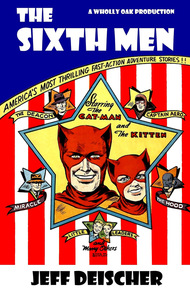
Jeff Deischer's two literary loves are pulp fiction and superheroes. Of his sixty published books, almost half star superheroes (more than anyone else on the planet has written); fifteen are classic action hero pulp (including the Avenger and Doc Savage pastiches, the first volume of the latter, Millennium Bug, winning the Tom Johnson Pulp Den 2018 award for Best New Pulp Novel), and another dozen or so non-action hero pulp, including murder mystery, space opera, sword and sorcery, and the like. Jeff's webpage is jeffdeischer.blogspot.com, where he posts the first chapters of the first novel in a new series, so that potential readers can peruse his work without having to spend several dollars on a paperback to find out if they like it or not.
Jeff Deischer, the author of over 25 superhero novels, re-imagines the Holyoke characters, moving them to the early 21st century on a world very much like our own but different in small ways. Every American superhero is drawn into a complex plot to conquer the Earth.
Millennium Bug, the first in the Doc Brazen series, a pastiche of Doc Savage, won Tom Johnson's Pulp Den 2018 Best New Pulp Novel award.
Once upon a comic book, the Holyoke publishing company put out comics featuring characters like Cat-Man and Kitten, Captain Aero, Black Friday, and Miss Victory. The company folded in the late 1940s, leaving behind a rich vein of superheroic mythology just waiting to be tapped. Decades later, Jeff Deischer did just that, resurrecting the best of Holyoke's Golden Age characters in this action-packed novel. I love retro projects like this that bring exciting, modern-day stories to life while looking to the past for inspiration. This book does so with great energy and spirit, restoring some truly great characters to colorful, thrilling life in a way that reminds me of the best aspects of the great American artform, the comic book. – Robert Jeschonek
Nice stuff: Groovy work, fast paced.
– Reader reviewQuiet as the grave. That was the saying. The same could be said of the city morgue, where Ozzie Harris worked, on the night shift. In the still of the night, the twenty-something attendant wrote his screenplay for a horror film based on his experiences in the morgue. It was about zombies. Zombies were all the rage in Wonderland, and Ozzie was striking while the iron was still hot. Fads came and went quickly in the film capital of the world more quickly than the seasons.
The bespectacled, wild-haired young man stopped typing abruptly when he heard a sound from the slab room, where corpses waiting to be autopsied lay in drawers. His surroundings, which spooked some people, normally did not bother him. But he normally did not hear noises where there should be none.
Ozzie sat, stock still for several moments, waiting for another sound. None came. He resumed typing on his old Rand typewriter.
Then he heard another noise.
This time he was certain. Ozzie rose from his desk in the outer room, and went into the slab room. He found one of the drawers open, its slab empty. The young writer did not need to consult the logbook to know what body was missing; he knew: the superhero Cat-Man.
Cat-Man had been the first of a wave of costumed vigilantes like those seen in comic books for the past sixty-some years. They were largely figures of fiction until just a year ago. First it was Cat-Man, then others had appeared, particularly after 9-11. The same sense of patriotism that had gripped the United States following Pearl Harbor once again swept across its residents, and a handful had responded to its call by donning costumes and secret identities.
If Ozzie Harris had gone to the window and looked out, he might have seen Cat-Man climbing the wall outside to the roof of the New Amsterdam City Police Forensic Sciences building, using small claws between his fingers and toes to ascend. He moved stiffly. Although the superhero expected it, he was not yet accustomed to it. Resurrection always did this to him.
Although his body had mended itself, making him fully healed, the same could not be said of his costume, crimson cowl with cat ears, trunks, boots, and gloves over a dark orange under-suit. It still displayed signs of the violence that had killed Cat-Man, torn and bloody.
As he reached the edge of the rooftop, he hissed in reproach, "Three times in my first year … ! At this rate, I won't live to see 2005 …."
For reasons he did not fully understand, David Merrywether had gained mystical abilities like those of a cat, including its legendary nine lives. He'd still been but a boy when his parents, Christian missionaries, were killed by bandits in India. Young David had been taken in by a tigress that had lost her cubs, and raised by her. By the time he left the jungle following his foster mother's murder in the mid-Nineties, he possessed superhuman strength, speed, and agility, as well as the heightened senses of smell, sight, and hearing. He used these to hunt down his foster mother's killers, and execute them. Then he began the long trek back to America, the land of his birth, since there was nothing left for him in the jungles of India.
After completing his formal schooling, which had been neglected for a decade, David got a private investigator's license, and set up shop in the New Amsterdam Times Building, the interior of which was mostly empty, though its exterior was covered in advertising since it overlooked Times Square, making it one of the most sought after places for promotion. Having an office there was good advertising for a PI just starting out. He was lucky to have had a small inheritance waiting for him to get him started in his new life.
Cat-Man headed home, his muscles warming up, losing their stiffness, as he made his way across Manhattan's rooftops.
